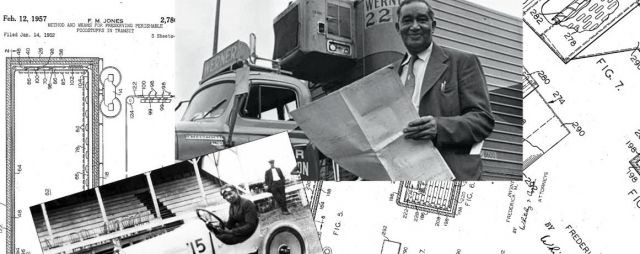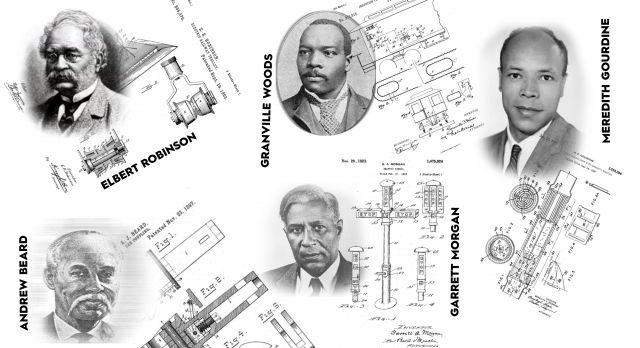Imagine loading up a truck with pallets of fresh blueberries, bananas, or tomatoes on a hot summer day. You close the doors and hope for the best. How far do you think the truck would travel before the beautiful produce starts to spoil?
There was a time in history when transporting produce, meat, blood, medicine and other perishable items across provinces, states and countries was not possible – that is - until the invention of the refrigerated trailer.
Pre-Reefer Transportation
In the 1930’s meat and produce was transported using trucks that were cooled with blocks of ice. These trucks faced several limitations. For starters, it was difficult to control the trailer temperature using ice and (especially on hot summer days) the amount of cooling the ice could provide was limited. The more ice that was needed to keep the trailer cool – the less space was available for perishable freight. Some goods such as meat (which often ended up with discolored spots) reacted negatively to ice cooling. Transport companies started using stationary cooling units in their trailers hoping to provide a colder and more consistent temperature; however, the constant vibrations of traveling over the road broke down parts of the system and quickly wore out lines. Another challenge of using stationary cooling units was powering the compressor. Despite the high amount of spoilage to produce and meat, no one seemed to be able to solve the problem of how to keep the trucks cool without using ice.
The Golf Game that Cooled the Industry
One hot summer day Harry Werner, Al Fineberg and Joe Numero were playing a round of golf. Earlier in the day, Harry Werner, President of Werner Transportation Co, had received noticed that one of his trucks delivered an entire load of spoiled poultry. During the golf game Werner asked of Al Fineberg, President of the United States Air Conditioning Co, why his company could manufacture cooling units for movie houses but was unable to make a unit that would keep a truck cool. Fineberg explained the reason to Werner as Joe Numero, President of Cinema Supplies Inc, listened in. Fineberg told Werner that cooling units could not withstand the constant vibrations of over the road travel and supplying electricity to run the compressor was difficult.
Numero (who had minimal knowledge about refrigeration) joked with Fineberg (a refrigeration expert) that if he could not solve the problem of trailer cooling, he could. Fineberg laughed at Joe Numero’s claim; however, he did not realize that Numero had an ace up his sleeve.
Who was Frederick McKinley Jones?
Frederick McKinley Jones was born on May 17th, 1893 in Covington, KY. His mother left him when Jones was just a small boy and his father struggled to raise him on his own. At age 7, Jones’ father passed away and he was taken in by a priest at a Catholic rectory in Cincinnati. At age 11, he completed 6th grade and left the rectory to get his first job as a cleaner. Jones had a natural talent with mechanics and an inventive mind. He was a voracious reader and was constantly looking for ways to advance regardless of the challenges placed in front of him. At age 14 he got a job as a mechanic and by 15 was the chief mechanic at a garage in Cincinnati.
Throughout his life Jones had gotten accustomed to being told “no”.
“Fred, you can’t be a steamboat pilot because of your race”.
“Fred, you cannot make a commercial sound movie machine”.
“Fred, you can’t be a race car driver because you are too young”.
No matter how many times he was told no, Frederick McKinley Jones found a way to accomplish all these dreams – and more!
A Cool Challenge
Joe Numero had heard of Jones when he invented a device to combine sound with motions pictures. Numero’s business was building movie houses, so he hired Jones to improve the sound equipment his company manufactured. After that golf game, Numero put the challenge of cooling transportation trucks in front of Fred Jones. True to his nature, Jones met the challenge – and he solved it!
Jones hit the books at the local library to learn everything he could about refrigeration. He had experience building race cars and knew how to design machinery to withstand the vibrations that came with racing. Up to that point, all the proposed trailer cooling solutions involved electric refrigeration units that would need to be plugged in – Jones had a better idea.
Instead of an electric unit, Fred Jones used a four-cylinder gas engine to power the compressor in the refrigeration unit. He integrated the use of a thermostat to control the temperature of the trailer by using a starter/generator flywheel to start and stop the engine automatically. His initial design was bulky and heavy, so he installed the unit to the underside of the trailer to avoid taking up valuable cargo space. Jones quickly noted that mounting the unit to the underside of the trailer exposed it to mud, rocks and other transportation hazards. This prompted him to move the unit to the top outside of the trailer – where it can still be found today.
Fred Jones wasn’t satisfied with his initial design, so he continued to refine it, making the unit more efficient and lighter. The design was completed around 1938 and Jones received a patent for his invention on July 12, 1940. The unit worked so well that Numero, who believe strongly in Fred Jones, decided to sell Cinema Supplies Inc to RCA and go into business with Jones. Together they formed the United States Thermo-Control Company. They named their refrigeration unit “Thermotrol”; however, they later renamed the device and the company “Thermo King”.
Leaving His Mark on Transportation
Frederick McKinley Jones passed away of lung cancer in Minneapolis in 1961. He had been awarded approximately 60 patents in his lifetime, 40 of which were in refrigeration. Jones’ other patents included portable x-ray machines, sound equipment, ticket dispensers, and gas engines. He received multiple awards and honors for his inventions and after his death was inducted into the Minneapolis Inventors Hall of Fame in 1977. In 1991, President Bush presented the widows of Fred Jones and Joe Numero with the National Medal of Technology in the White House Rose Garden. Jones was the first Black American to receive this honor.
We can give many thanks to Fred Jones’ creative and mechanical genius for the Reefer Trailer. Because of this invention we can enjoy fruits, vegetables and meat from other provinces, states and countries. Pharmaceutical companies can distribute temperature sensitive medicines to mass populations and blood banks can deliver life-saving blood to areas in great need. Not only has this invention helped to better feed the planet, but it has also helped to save and improve the health of people around the world.

